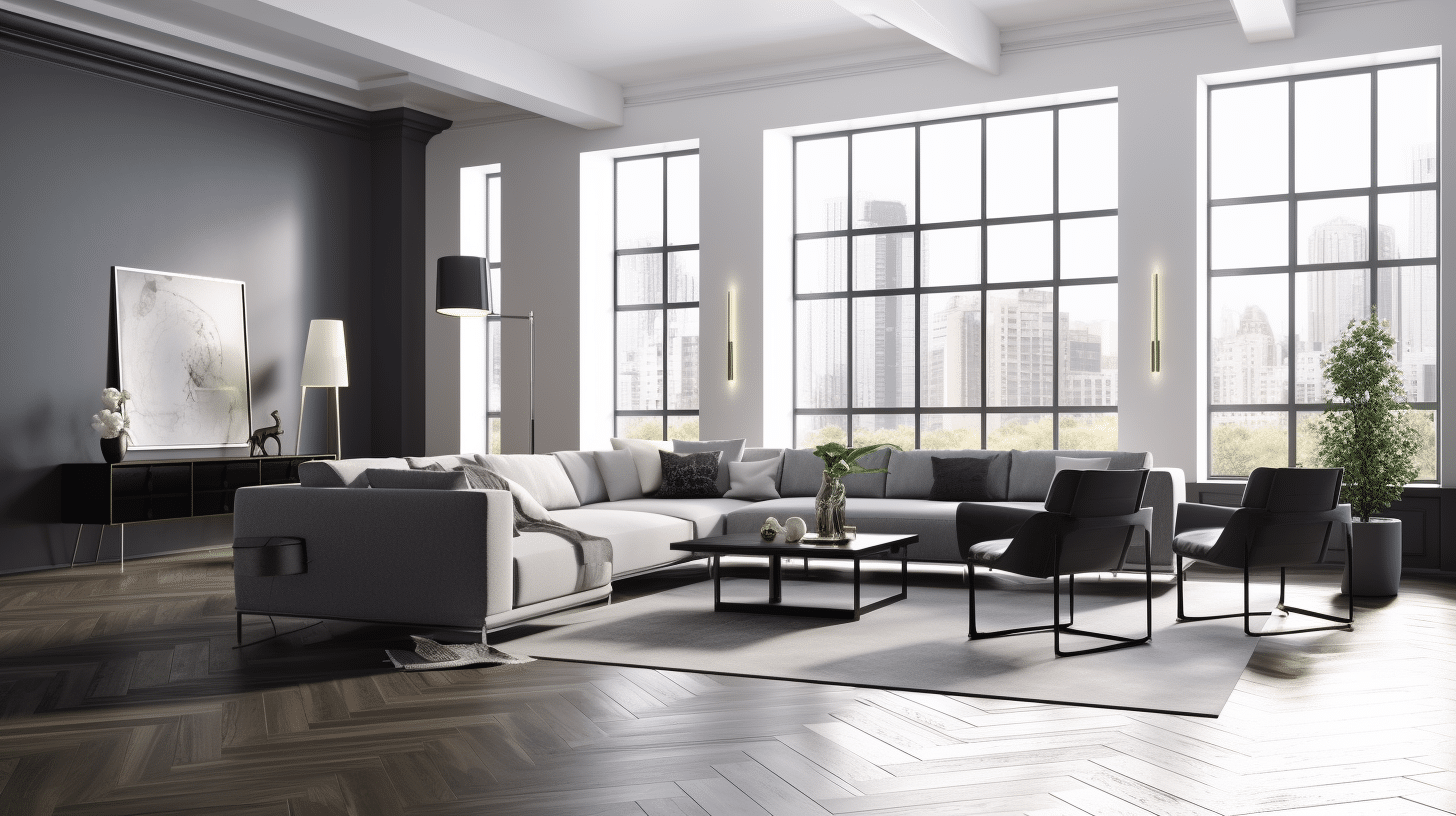Vinyl flooring is the perfect choice for modern homes due to its versatility and low maintenance needs. It’s made of synthetic materials, making it affordable and easy to install. Plus, it comes in a wide range of colors and patterns, so homeowners can pick the perfect design for their space.
Durability is a key advantage of vinyl flooring. Unlike other types, vinyl can stand up to heavy foot traffic, so it’s great for kitchens and hallways. Plus, vinyl is resistant to moisture and stains – perfect for bathrooms or areas prone to spills.
Vinyl flooring is also budget-friendly. Compared to hardwood or tile, it’s much more affordable and often costs less to install. Many homeowners opt for vinyl as a cost-effective way to get the look of wood or stone at a fraction of the price.
Overall, vinyl is a great choice for any interior design project. My friend just installed luxury vinyl planks in her Chicago apartment – despite the high-traffic area near busy streets, these floors still looked pristine months later! Hardwood wouldn’t have been a practical option for her busy lifestyle. Vinyl flooring: the perfect solution for those who want to look stylish and live comfortably.
Advantages of Vinyl Flooring for Modern Homes
Vinyl flooring is a great choice for modern homes due to its many advantages. It’s long-lasting, water-resistant, and easy to clean. Plus, it’s affordable and offers loads of customization options.
Here are six other benefits of vinyl flooring:
- It’s an excellent insulator, making your home warm and cozy.
- You can choose from an array of colors and patterns.
- Vinyl flooring attracts less dust and dirt, and resists stains, making it perfect for families with kids or pets.
- It won’t fade in sunlight over time.
- The material absorbs sound waves more efficiently than other floor coverings.
- It’s highly resistant to scratches, dents, and chipping, and can handle lots of foot traffic.
In addition, vinyl can be installed quickly and won’t need replacing often. Recent studies show that more homeowners are choosing vinyl due to its attractive and practical qualities. Oh, and one more thing – it’s way better than hardwood when it comes to water-resistance!
Comparison with Other Flooring Options
Vinyl Flooring–Beat Out Other Types of Floors?
When it comes to flooring choices for modern homes, vinyl is a top pick. Let’s compare it to others:
| Vinyl | Hardwood | Laminate | Tile | |
|---|---|---|---|---|
| Durability | High | High | Medium | High |
| Cost | Low | High | Low | Medium |
| Maintenance | Low | High | Medium | High |
| Moisture Res. | High | Low | Lowest | High |
| Install Diff. | Easy-Mod. | Mod.-Diff. | Mod.-Easy | Mod.-Diff. |
It’s clear that vinyl has a major advantage–it’s cheaper and easier to maintain than hardwoods or tiles. Plus, it has great moisture resistance, making it perfect for wet areas like a bathroom.
And, as far as installation goes, vinyl wins out. It’s easy to install and takes less time than hardwoods or tiles. This makes it ideal for quick home makeovers.
Don’t be a vinyl naysayer–embrace this amazing flooring option for modern homes.
Conclusion: Why Vinyl Flooring is the Best Choice for Modern Homes
Vinyl flooring is an ideal choice for modern homes – it’s versatile, durable and economic. Plus, it offers style and sophistication with a range of designs. Installing, cleaning and maintaining this flooring is easy. Families with children or pets, especially, prefer vinyl flooring!
Plank, tile and sheet vinyl come in various types. It can easily imitate expensive materials like hardwood, stone or ceramic – but without the heavy costs. Plus, it’s waterproof, making it perfect for kitchens and bathrooms. And, eco-conscious consumers love that it doesn’t produce harmful chemicals during installation.
Vinyl Flooring has been popular since the 1930s. In the 1950s, manufacturers started producing high-end residential products. Design patterns have improved drastically. Now, you can get matte finishes and embossed linings that mimic natural phenomena, such as granite and marble.
Frequently Asked Questions
Q: What is vinyl flooring?
A: Vinyl flooring is a popular synthetic flooring that is made of several layers, including a PVC backing, printed design layer, and a clear, protective wear layer.
Q: What are the advantages of vinyl flooring?
A: Vinyl flooring is durable, easy to maintain, and water-resistant. It is also cost-effective, versatile, and can mimic the look of other flooring materials such as hardwood, tile, or stone.
Q: Is vinyl flooring safe to use in homes?
A: Yes, vinyl flooring is safe to use in homes. However, it is important to choose low- VOC (volatile organic compounds) vinyl flooring that does not emit harmful chemicals into the air.
Q: Can vinyl flooring be installed over existing floors?
A: Yes, vinyl flooring can be installed over existing floors. However, it is important to ensure that the existing floor is clean, level, and free from any damages before installing the new vinyl flooring.
Q: What is the lifespan of vinyl flooring?
A: The lifespan of vinyl flooring depends on the quality of the flooring and the amount of foot traffic it receives. On average, good quality vinyl flooring can last up to 20 years or more with proper maintenance.
Q: How do I maintain vinyl flooring?
A: To maintain vinyl flooring, it is important to regularly sweep or vacuum the floor to remove dirt and debris. Use a damp mop with a mild cleaning solution to clean the floor. Avoid using abrasive scrubbers or cleaners that can damage the protective wear layer.


